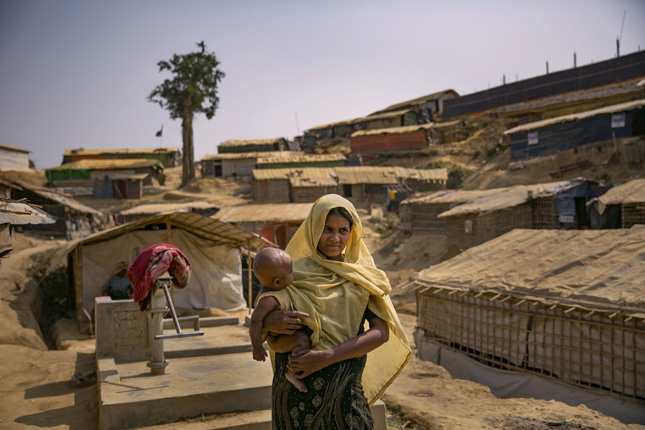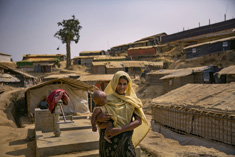-
Death From Delay: Improving Maternal Health Care in Conflict Zones
August 13, 2018 By Yuval Cohen How much time passes before a woman—or her relatives—decide to seek care or emergency medical services during pregnancy? It often depends on how much they know about the services available.
How much time passes before a woman—or her relatives—decide to seek care or emergency medical services during pregnancy? It often depends on how much they know about the services available.This information may be hard to come by in conflict-affected areas, especially among internally displaced women. According to a retrospective study of health care during the 2006 war in Lebanon, 80 percent of Lebanese pregnant women before the war sought antenatal care, while the share of displaced women seeking care was only 34.5 percent.

Reaching Every Woman
How much time passes before a woman—or her relatives—decide to seek care or emergency medical services during pregnancy? It often depends on how much they know about the services available.
This information may be hard to come by in conflict-affected areas, especially among internally displaced women. According to a retrospective study of health care during the 2006 war in Lebanon, 80 percent of Lebanese pregnant women before the war sought antenatal care, while the share of displaced women seeking care was only 34.5 percent.
The decline was due, in part, to lack of adequate information about available services, which was especially acute when refugees and displaced women were not formally accounted for—if they were staying with relatives, for example, or with friends. These women were often overlooked when providers relayed important health information to displaced communities.
Perceptions Matter
Even when women are fully informed, some still do not to seek out medical attention. Syrian refugees in Za’atri Camp and Irbid City in Jordan shied away from the health facilities due to their poor reputation, according to an evaluation published in Conflict and Health in 2015.
In Za’atri Camp, many women knew they could access services for free, but were hesitant to visit. “A few women in Za’atri Camp described deterioration in the quality of services over time, including a lack of physical examinations and drugs and unqualified health providers,” the evaluation reports.
In Irbid, an urban city home to almost 140,000 Syrian refugees, women were reluctant to use the health facilities as “they were perceived to be ‘bad’ quality due to the lack of privacy and female providers.”
Providing health services for adolescent girls in complex emergencies is crucial to ensure that young displaced women do not fall behind when it comes to their healthcare. But they need targeted services; UNFPA reported that adolescents in Rakhine, Myanmar, for example, did not seek care as the services were not perceived to be “youth-friendly.”
Ending Disrespect and Abuse
The disrespect and abuse that women often face during pregnancy and childbirth only gets worse in times of conflict. The urgent need in crisis settings sometimes leads the humanitarian community to overlook the quality of care.
For example, a 2017 white paper on respectful maternity care describes the case of Amal, a 17-year-old from Yemen, who gave birth in a NGO-funded health facility. “When she delivered her last child, the health providers told her not to cry, scream, or call them when she feels pain,” the authors reported.
But people in crisis settings don’t get to choose their health providers; in some settings, women must choose between delivering in an abusive setting or taking the risk of delivering at home.
Why is disrespect and abuse exacerbated in humanitarian settings? According to a 2018 report from the Global Respectful Maternity Care Council, “in conflict settings, health workers are at heightened risk of burnout/compassion fatigue, secondary trauma, and depression.”
Additionally, resource constraints make health facilities less likely to provide sufficient information and privacy for pregnant women, and cultural and language barriers can make it difficult to obtain legitimate consent for procedures, such as caesareans.
Over-medicalization of care is another facet of disrespect and abuse. In Greece in 2016, volunteers found that a staggering 60 percent of refugee mothers they interviewed were coerced into caesarean sections without proper consent: “None of the women interviewed by the volunteers were invited to question any form or decision being made for her. One of them underwent a removal of the uterus after the C-section, without ever being informed about the reason why.”
High-Quality, Accountable Health Care for All
Minimizing the delay in seeking care may take a targeted, integrated approach, including innovations that are designed to create more “demand” on the patients’ side. However, addressing the underlying factors that often result in disrespect and abuse by health providers—such as weak infrastructure, traumatic and stressful working conditions, and a lack of resources—is fundamental.
The Global Respectful Maternity Care Council called for strengthening accountability in the care for pregnant women. The council recommended deploying social accountability innovations, such as citizen monitoring and community “scorecards,” in addition to a reinforced global commitment to the Core Humanitarian Standard on Quality and Accountability.
While providing maternal and reproductive care for conflict-affected populations is crucial, ensuring that this care is of the highest possible quality is key to reducing delays in seeking care.
Sources: American Refugee Committee International, Conflict and Health, Health Care for Women International, Medium, Office of the United Nations High Commissioner for Human Rights, Social Science & Medicine Journal, The Guardian, The Sphere Project, United Nations High Commissioner for Refugees, United Nations Population Fund, White Ribbon Alliance, Women’s Refugee Commission, Yemeni Board for Medical Specializations
Photo Credit: A Rohingyan woman walks past a water pump in Balukhali camp, March 2018. Photo by UN Women/Allison Joyce.
Topics: conflict, Dot-Mom, featured, gender, global health, humanitarian, Jordan, maternal health, respectful care, security, Syria, The Three Delays, Yemen
 A Publication of the Stimson Center.
A Publication of the Stimson Center.

 How much time passes before a woman—or her relatives—decide to seek care or emergency medical services during pregnancy? It often depends on how much they know about the services available.
How much time passes before a woman—or her relatives—decide to seek care or emergency medical services during pregnancy? It often depends on how much they know about the services available.

